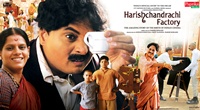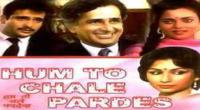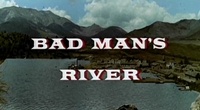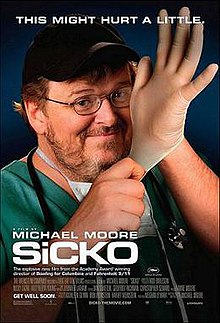Sicko (stylized as SiCKO) is a 2007 American documentary film made by filmmaker Michael Moore. The film investigates health care in the United States, focusing on its health insurance and the pharmaceutical industry. The movie compares the profiteering, non-universal U.S. system with the non-profit universal health care systems of Canada, the United Kingdom, France and Cuba.
| SiCKO | |
|---|---|
Theatrical release poster | |
| Directed by | Michael Moore |
| Produced by |
|
| Written by | Michael Moore |
| Starring | Michael Moore |
| Narrated by | Michael Moore |
Production company | Dog Eat Dog Films |
| Distributed by |
|
Release date |
|
Running time | 123 minutes |
| Country | United States |
| Language | English |
| Budget | $9 million |
| Box office | $36 million |
Sicko was made on a budget of about $9 million, and grossed $25 million theatrically in the United States. This box office take exceeded the official expectation of The Weinstein Company, which had hoped for a gross in line with Bowling for Columbine's $22 million US box office gross.
Screenplay
According to Sicko, almost fifty million Americans are uninsured while the remainder, who are covered, are often victims of insurance company fraud and red tape. Furthermore, Sicko references the World Health Organization which lists the U.S. health in general as ranked 37 out of 191, with certain health measures, such as infant mortality and life expectancy, equal to countries with much less economic wealth. Interviews are conducted with people who thought they had adequate coverage but were denied care. Former employees of insurance companies describe cost-cutting initiatives that give bonuses to insurance company physicians and others to find reasons for the company to avoid meeting the cost of medically necessary treatments for policy holders, and thus increase company profitability.
In Canada, a citizen describes the case of Tommy Douglas, who was voted the greatest Canadian in 2004 for his contributions to the Canadian health system. Moore also interviews a microsurgeon and people waiting in the emergency room of a Canadian public hospital.
Against the backdrop of the history of the American health care debate, opponents of universal health care are set in the context of 1950s-style anti-communist propaganda. A 1950s record distributed by the American Medical Association, narrated by Ronald Reagan, warns that universal health care could lead to lost freedoms and socialism. In response, Moore shows that socialized public services like police, fire service, the United States Postal Service, public education and community libraries have not led to communism in the United States.
The origins of the Health Maintenance Organization Act of 1973 are presented using a taped conversation between John Ehrlichman and President Richard Nixon on February 17, 1971; Ehrlichman is heard telling Nixon that "...the less care they give them, the more money they make," a plan that Nixon remarked "fine" and "not bad." This led to the expansion of the modern health maintenance organization-based health care system. Connections are highlighted between Pharmaceutical Research and Manufacturers of America (PhRMA), the lobbying arm of the largest drug companies in the United States, lobbying groups in Washington D.C., and the Congress. Hillary Clinton, a champion of the Clinton health care plan, is shown as a crusader for change, appointed to reform the health care system in the United States by her husband, newly elected President Bill Clinton. Her efforts are met with heavy-handed criticisms by Republicans on Capitol Hill, and right-wing media throughout the country, who characterize her plan as the harbinger of socialism. When she is defeated, her punishment is to "never speak of it again while in the White House." Seven years later, her silence is rewarded, as she becomes a Senator via Healthcare Industry Contributions, the second largest recipient in the Senate.
In the United Kingdom, a country whose National Health Service is a comprehensive publicly funded health care system, Moore interviews patients and inquires about in-hospital expenses incurred by patients, only to be told that there are no out-of-pocket payments. Moore visits a typical UK pharmacy, where pharmaceuticals are free of charge for all persons in Northern Ireland, Scotland and Wales and under 16, 16–17 in full-time education, disabled, unemployed, or over 60 in England, and subsidized in most cases for everyone else (in England); only a fixed amount of £6.65 (about $10) per item on a prescription was charged, irrespective of cost to the NHS. Further, NHS hospitals employ a cashier, part of whose job is to reimburse low-income patients for their out-of-pocket travel costs to the hospital. Interviews include an NHS general practitioner, an American woman residing in London, and British politician Tony Benn, who concedes that a hypothetical dismantling of the NHS would lead to a revolution.
In France, Moore visits a hospital and interviews the head of obstetrics and gynaecology and a group of American expatriates. Moore rides with the "SOS Médecins", a 24-hour French medical service that provides house calls by physicians. Moore discovers that the French government provides many social services and rights in addition to health care, such as daycare for $1 an hour, free college education, a minimum five weeks paid vacation by law, vacation, and neonatal support that includes cooking, cleaning, and laundry services for new mothers.
Returning to the United States, interviews disclose that 9/11 rescue workers who volunteered after the September 11, 2001 attacks were denied government funds to care for physical and psychological maladies they subsequently developed, including respiratory disease and PTSD-induced bruxism. Unable to receive and afford medical care in the United States, the 9/11 rescue workers, as well as all of Moore's friends in the film needing medical attention, set sail from Miami to Cuba on three speedboats in order to obtain free medical care provided for the enemy combatants detained at the U.S. Guantanamo Bay detainment camp. The group arrives at the entrance channel to "Gitmo" and Moore uses a megaphone to request access, pleading for the 9/11 victims to receive treatment that is on par with the medical attention the "evildoers" are receiving. The attempt ceases when a siren is blown from the base, and the group moves on to Havana, where they purchase inexpensive medicine and receive free medical treatment at the elite Hermanos Ameijeiras Hospital. Providing only their names and birth dates, the volunteers are hospitalized and receive medical attention. Before they leave, the 9/11 rescue workers are honored by a local Havana fire station.
Finally, Moore addresses the audience, emphasizing that people should be "taking care of each other, no matter the differences." To demonstrate his personal commitment to this theme, Moore decides to help one of his biggest critics, Jim Kenefick. According to a blog posting, Kenefick feared he would have to shut down his anti-Moore website because he needed US $12,000 to cover the costs of medical treatment for his sick wife. Not wanting the U.S. health care system to trump Kenefick's ability to express his opinion, Moore sends Kenefick the money himself.
This film ends with Moore walking towards the United States Capitol with a basket full of his clothes, sarcastically saying he will get the government to do his laundry until a better day comes for the sick and hopeless who are unable to receive health care.
Sicko premiered on May 19, 2007, at the 2007 Cannes Film Festival, receiving a 17-minute standing ovation from 2,000 people at the Grand Theatre Lumiere. The North American première of Sicko was held in London, Ontario (where some scenes from the movie were filmed), at the Silver City movie theatre at Masonville Place on June 8, 2007, with Moore in attendance. It also had an early première in Washington DC. on June 20, two days before its U.S. release, with Moore appearing at a Capitol Hill press conference to promote the film.
The European première was held in Great Britain on October 24, 2007, at the Odeon Leicester Square as part of the 51st London Film Festival. Moore was to introduce the film, but remained in the United States due to a 'family issue', sending a lengthy letter to be read in his absence. Part of the letter gave thanks to the Rt Hon. Tony Benn, featured in the film, who delivered a short speech before the showing.
Box office
Made on a budget of $9 million, Sicko earned $4.5 million on its opening weekend. In 441 theaters, it took in an average of $10,204 per theater, the second highest average gross of the weekend. As of February 24, 2008, Sicko has grossed $25 million in the United States and $11 million in foreign markets. Overall, the movie has made over $36 million. The film was also a huge success in DVD sales in which it accumulated over $60 million in sales.
Critical reaction
According to the review aggregator Rotten Tomatoes, the film boasts a 92% positive rating, based on 215 reviews, with an average rating of 7.7/10. The website's critical consensus reads, "Driven by Michael Moore's sincere humanism, Sicko is a devastating, convincing, and very entertaining documentary about the state of America's health care." Metacritic reported the film had an average score of 74 out of 100, based on 39 reviews, indicating "generally favorable reviews". After its Cannes release, Variety described Sicko as "an affecting and entertaining dissection of the American health care industry".
In an early review a week before the premiere, Richard Roeper and Michael Phillips gave the film two thumbs up. Roger Friedman of Fox News called the film a "brilliant and uplifting new film" and praised Moore for the way in which he lets "very articulate average Americans tell their personal horror stories at the hands of insurance companies" and "criticizes both Democrats and Republicans for their inaction and in some cases their willingness to be bribed by pharmaceutical companies and insurance carriers."
British film magazine Empire praised Moore's filmmaking and personal artistic vision, exclaiming "Sicko is the film that truly reveals Moore as an auteur."
David Denby of the New Yorker called the film "feeble, even inane", but film critic Stephen Schaefer of The Boston Globe described Sicko as "a very strong and very honest film about a health system that's totally corrupt and that is without any care for its patients".
The film was listed as the 4th best film of 2007 by Carina Chocano of Los Angeles Times, as well as 8th best by Marjorie Baumgarten of The Austin Chronicle.
Awards
Sicko was nominated for an Academy Award for Best Documentary Feature. It was also commended in the Australian Film Critics Association 2007 Film Award for Best Documentary.
News media
Journalist John Stossel wrote an article in the Wall Street Journal that claimed Julie Pierce's husband, Tracy, featured in Sicko, would not have been saved by the bone marrow transplant denied by his insurer. Stossel also questioned whether this treatment would have been given in a universal health care system, citing rationing and long waiting lists in Canada and Britain. Julie Pierce claimed Stossel never contacted her or her husband's doctors, and that the insurer denied other treatments as well and questioned Stossel's assertion that Tracy would not have received this in a socialized system, arguing that they are performed more frequently in Canada than in the U.S.
Moore insisted in the movie as well as in an interview with Stossel that the treatment provided in the Hermanos Ameijeiras Hospital was just like that given to any Cuban; but Stossel's investigations led Stossel to conclude that the hospital provided service only for the Cuban elite and that this care was not available to the average Cuban. In response to criticism that only well-to-do Cuban citizens receive a decent standard of health care, Michael Moore adduced on his website the result of an independent Gallup Poll in which "a near unanimous 96 percent of respondents say that health care in Cuba is accessible to everyone". An article in the Miami Herald interviewing some Cuban exiles in the United States criticized Sicko for painting a rosy picture of the Cuban healthcare system.
In an article publish
Watch movie Sicko online on Amazon
Watch movie Sicko online
Watch The Movie On PrimeAakhri Adaalat Full HD Movie Download

Siva Full HD Movie Download

Aadmi (1978) Full HD Movie Download
.jpg)
Patanga Full HD Movie Download

Mera Saaya Full HD Movie Download

Mawaali Full HD Movie Download

Sheetla Mata Full HD Movie Download

Sharda (1957) Full HD Movie Download
.jpg)
Harishchandrachi Factory Full HD Movie Download

Hum To Chale Pardes Full HD Movie Download

Vijetha (Telugu) Full HD Movie Download
.jpg)
Maun Full HD Movie Download

Khurchi Samrat Full HD Movie Download

Agni Satchi Full HD Movie Download

Bad Mans River Full HD Movie Download

Police Commissioner Full HD Movie Download

Akkum Bakkum Full HD Movie Download

Aakhri Baazi Full HD Movie Download

Amar Prem Full HD Movie Download

Anusandhan (Bengali) Full HD Movie Download
.jpg)
Mastan (Bengali) Full HD Movie Download
.jpg)
Download latest Movie from bollywood
- 1> baaghi 3
- 2> THE SKY IS PINK MOVIE FULL STORY AND REVIEW
- 3> Luka Chuppi
- 4> TO ALL THE BOYS I’VE LOVED BEFORE
- 5> Kabir Singh
- 6> Street Dancer 3D
- 7> Simmba
- 8> Gone Girl
- 9> The Girl Who Lived
- 10> Ludo
- 11> DILWALE DULHANIA LE JAYENGE
- 12> GUILTY
- 13> The Godfather
- 14> Adventures of Rusty
- 15> Sooryavanshi
- 16> Satyameva Jayate 2
- 17> Thappad
- 18> Bhool Bhulaiyaa 2
- 19> KGFChapter 2
- 20> Mardaani 2
- 21> Pinjar
- 22> Shivaji maharaj
- 23> Ek Villian 2
- 24> Hungama 2
- 25> Divergent
- 26> Mumbai Saga
- 27> The Internship
- 28> HIT (telugu)
- 29> Panga
- 30> The perfect date
- 31> 16 December
- 32> Gopala Gopala (Telugu)
- 33> Brahmastra
- 34> Gangubai Kathiawadi
- 35> Manmadhudu
- 36> Nenu local
- 37> Mahanati
- 38> Shatamanam bavathi
- 39> Lagaan
- 40> After
- 41> MOM
- 42> Shamshera
- 43> Raguvaran BTech
- 44> Khakee
- 45> The villain
- 46> OM
- 47> Mr. perfect
- 48> Bueatifull mind
- 49> Hichki
- 50> Gabbar Singh
- 51> Jogi
- 52> Before Sunrise
- 53> Before Sunset
- 54> Before Midnight
- 55> The Big Bull
- 56> Top Gun: Maverick
- 57> The Purge
- 58> The Sky is Pink
- 59> Laxmmi Bomb
- 60> Sadak 2
- 61> Sufna
- 62> Prithviraj
- 63> PK
- 64> Coolie No 1(2020)
- 65> Black Widow
- 66> Dear Zindagi
- 67> Dil Bechara
- 68> PHIR HERA PHERI
- 69> WAR
- 70> Dostana
- 71> RRR: Roudram Ranam Rudhiram
- 72> Maidan
- 73> Dabbang 3
- 74> Chhalaang
- 75> life as we know it
- 76> SherShaah
- 77> Sandeep Aur Pinky Faraar
- 78> Event Horizon
- 79> 83
- 80> Radhe: Your Most Wanted Bhai
- 81> Gunjan Saxena: The Kargil Girl
- 82> Mr India
- 83> Vivah
- 84> Anokha Bandhan
- 85> Ghost
- 86> Bhoot: Part One - The Haunted Ship
- 87> Haseen Dilruba
- 88> Laal Singh Chaddha
- 89> Qismat
- 90> Rajput
- 91> Drive
- 92> Dil Chahta Hai
- 93> Dil Ki Baazi
- 94> Dil Ka Rishta
- 95> Teesri Manzil
- 96> Dil
- 97> Love Aaj Kal
- 98> Khaali Peeli
- 99> Bunty Aur Babli 2
- 100> Atrangi Re
- 101> Gulabo Sitabo
- 102> Jodi
- 103> Suraj Pe Mangal Bhari
- 104> Deewana
- 105> Attack
- 106> Sardar Udham Singh
- 107> Toofan
- 108> THE LOVEBIRDS
- 109> Jersey
- 110> Ginny Weds Sunny
- 111> Thalaivi
- 112> Shiddat
- 113> Angels vs Zombies
- 114> Koi Mil Gya
- 115> Thank God
- 116> Bhuj: The Pride of India
- 117> Hum Aapke Hain Kaun
- 118> The Platform
- 119> Bird Box
- 120> Roohi Afzana
- 121> Torbaaz
- 122> Nikamma
- 123> World War Z
- 124> Extraction
- 125> Train to Busan
- 126> Life of Pi
- 127> SHAADI MEIN JROOR AANA
- 128> Himmat Aur Mehnat
- 129> To All The Boys: P.S. I Still Love You
- 130> Mimi
- 131> Good Newwz
- 132> Shubh Mangal Zyada Saavdhan
- 133> Raabta
- 134> Harry Potter and the Philosopher's Stone
- 135> Harry Potter and the Chamber of Secrets
- 136> Chhapaak
- 137> War of the Worlds
- 138> Harry Potter and the Prisoner of Azkaban
- 139> Harry Potter and the Goblet of Fire
- 140> MURDER MYSTERY
- 141> Shakuntala Devi
- 142> Bachchan Pandey
- 143> Jayeshbhai Jordar
- 144> Sheer Qorma
- 145> Saina
- 146> 'O' Pushpa I hate tears
- 147> Kedarnath
- 148> MS Dhoni The Untold Story
- 149> Chhichhore
- 150> Badhaai Ho
- 151> Unstoppable
- 152> Oz the Great And Powerful
- 153> The Girl on the Train
- 154> Haathi Mere Saathi 2020
- 155> The Conjuring: The Devil Made Me Do It
- 156> Gandhi Se Pehle Gandhi
- 157> The Song of Scorpions
- 158> Srimanthudu
- 159> Hello Guru Prema Kosame
- 160> Beauty and The Beast
- 161> Black Panther
- 162> Charlie and the Chocolate Factory
- 163> Bole Chudiyan
- 164> Fidaa
- 165> Duvvada Jagannadham
- 166> Bruce Lee: The Fighter
- 167> Hyper
- 168> Yaara
- 169> Red (2020)
- 170> Shivam
- 171> That Is Mahalakshmi
- 172> Nishabdham
- 173> Aashram 2020 web series
- 174> Laxmii
- 175> Mismatched
- 176> STUDENT OF THE YEAR 2
- 177> NAIL POLISH
- 178> Ramprasad Ki Tehrvi
- 179> KAAGAZ
- 180> 12 o Clock
- 181> The Power
- 182> bolo hau
- 183> Tribhanga
- 184> JAMUN
- 185> Madam Chief Minister
- 186> Maasaab
- 187> Aadhaar
- 188> Tanhaji
- 189> Bhaagi 3
- 190> Bhootnath
- 191> MALANG
- 192> Jai Mummy Di
- 193> Haathi Mere Saathi 2021
- 194> Shakeela
- 195> Unpaused
- 196> Annayya
- 197> Vamsoddharakudu
- 198> Mrugaraju
- 199> Narasimha Naidu
- 200> Sankranti
- 201> Manasu Maata Vinadhu
- 202> Anjaane
- 203> Apaharan
- 204> Bachke Rehna Re Baba
- 205> Bewafaa
- 206> Roohi
- 207> Radhe
- 208> Zindagi Khoobsoorat Hai
- 209> Yeh Mohabbat Hai
- 210> Yeh Kya Ho Raha Hai?
- 211> The Tomorrow War
- 212> DehradunDiary
- 213> Meri Shaadi Karaoo
- 214> Matruu Ki Bijlee Ka Mandola
- 215> No One Killed Jesica
- 216> Aag Ka Goola
- 217> Eight Million Dollars
- 218> Three Hundred
- 219> Cats and Dog
- 220> Decoy
- 221> Gold Rush
- 222> You Have Got Mail
- 223> Final Destination three
- 224> Tofan
- 225> Jungle
 Story of movie Sicko :
Story of movie Sicko : 